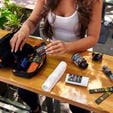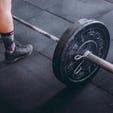In the sports performance industry, Joe DeFranco is known as “The Pro Maker” – a gun for hire used by athletes seeking an edge on the competition. This nickname did not happen by accident.
Framed jerseys of former Dallas Cowboys wide receiver Miles Austin, New York Giants offensive lineman Dave Diehl, star of HBO’s Hard Knocks Houston Texans Linebacker Brian Cushing and a few others line the east wall. A device called the Tred Sled, a treadmill missing the motor and driven by human effort, stands resolute in the middle of the floor – a torture device waiting for a victim. Kettlebells with faces of the great apes and legendary beasts stare at you, daring you to try and defeat them.
This is the gym environment DeFranco has cultivated, in which college football players eager to begin summer training promptly deposit their breakfast on the asphalt out back during a conditioning session. He’s adamant about nothing artificial ruining what he has built.
“This is my life,” DeFranco said. “This is my business. It’s difficult to make a living with a warehouse gym.”
But that never stopped him.
DeFranco’s training techniques have brought projected seventh round NFL draft picks up to the third round, and projected third round picks up to the first round. His client list boasts NFL players from all 32 NFL teams, Major League Baseball players, MMA fighters, NHL Hockey players, Olympic athletes, high school and college athletes from over a dozen different sports, and professional wrestlers. It’s no wonder DeFranco’s Gym is a staple on the Men’s Health Top 10 Gyms in America list. And to think it all started out of a 500 square foot storage closet…
Pro Athletes Trained by DeFranco
CLICK ON THE MAP PINS TO LEARN MORE
Joe’s Early Years
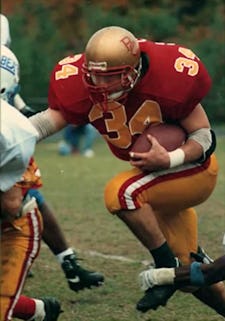 Like most people in the fitness industry, Joe DeFranco grew up obsessed with sports. His life revolved around playing football and someday playing in the NFL. He was a three-year starter at nationally ranked powerhouse Bergen Catholic High School in Oradell, New Jersey.
Like most people in the fitness industry, Joe DeFranco grew up obsessed with sports. His life revolved around playing football and someday playing in the NFL. He was a three-year starter at nationally ranked powerhouse Bergen Catholic High School in Oradell, New Jersey.
Joe played fullback and linebacker leading the Crusaders to a 22-0 record and back-to-back state championships during his junior and senior years. Although Joe was a team captain and standout player, his performance was hindered his senior year due to excruciating pain in his low back and leg.
All of the Division 1 schools that were recruiting him started to back off. When it was all said and done, Joe did not receive any D1 scholarship offers. Although he was devastated, he knew he had a bigger problem on his hands:
“Doctors discovered a tumor growing in my sacrum. The excruciating pain I was living with for four years turned out to be an osteoid osteoma, which is a benign tumor found inside a bone. Since my football career got cut short due to the tumor, I knew I wanted to do the next best thing with my life – I wanted to help other athletes achieve their goals.”
DeFranco started hitting the books with the same intensity he devoted to football. He went to college and majored in Exercise Physiology and read everything he could get his hands on about how to improve athletic performance.
“I turned into a research freak. After college, I traveled all over the country and went to every seminar and read every book I could afford. Instead of going back to school and getting my Master’s degree, I decided to continue my studies in the real world. The rest, as they say, is history.”
After completing his college internship, Joe was hired as a personal trainer at a sports performance facility in New Jersey. He worked there for five years before leaving to start his own business. He didn’t have enough money to open his own facility, so he contacted the owner of the gym he trained at during his college summer break.
Joe remembered seeing a vacant storage closet located in the basement of that gym, so he asked the owner if he would allow him to rent out the storage closet. The owner thought Joe was crazy, but ended up accepting his offer. In February of 2003, Joe founded DeFranco’s Training Systems, LLC and opened his 500 square foot storage closet “gym”…
The Legend Begins
High school kids started training with Joe in his hardcore closet. Whenever a high school kid dunked at a basketball game, the parents in the crowd would turn and say, ‘Must be a DeFranco kid’.
“The stories I can tell you are endless. I guess you can say the ‘legend’ of DeFranco’s Gym started with those high school kids in the infamous storage closet.” One of those kids who began training in that infamous storage closet was Houston Texans Star Linebacker Brian Cushing.
Brian Cushing
Brian Cushing was one of the lab rats of DeFranco’s World Wide Web Renowned Strength Program “Westside for Skinny Bastards” in 2003 and an original disciple of the storage closet gym. Joe DeFranco first saw Cushing in the seventh grade, scouting the talent coming into DeFranco’s alumnus, Bergen Catholic High School. It was fitting when they started training together in Joe’s Storage Closet when the linebacker was 16.
Brian laid out his dreams in DeFranco’s office the first time they met. He wanted to be the best high school linebacker in the nation, get a scholarship to play football at a big time college, and then play in the NFL. Each goal was a stepping stone to the next one. To achieve them all, he had to work hard.
The prevailing perception is that genetics trumps everything else. If you don’t have good genes and an innate talent for a sport, you’ll never make it as a pro. Or so the theory goes. The problem though, is that most kids that are genetic freaks don’t want to put in the hard work. They’re content being big fish in their small ponds. It’s hard for them to see the guy that’s better than them on the other side of the fence.
“[But Cush] was that kid who was like, ‘I’m going to outwork everybody and eat better than everyone.’”
This dedication to everything that could make him better is how Cushing managed to go from 213 to 231 pounds in 16 weeks. Results like these are possible with DeFranco’s programming.
“Take a genetic freak, add this kind of work for your entire life, throw in the proper diet and supplementation, and you have Brian Cushing,” DeFranco said. “It’s possible…”
DeFranco’s Gym Gains Notoriety
It wasn’t long before rumors and gossip regarding DeFranco’s training methods and his “back room” started surfacing…
“Is it really a storage closet?” “What do they do back there?” “How is everyone getting so jacked?” “Can anyone go back there?”
The buzz spread way beyond that of just the local high schools and colleges. After only a few months in business, DeFranco had seven members from the New York Giants training with him.
“There was a certain mystique about that storage closet that can’t be explained unless you were there,” DeFranco says. “My style of training, coupled with driven athletes, and a primal atmosphere ended up creating the perfect storm.”
DeFranco attributes much of his success to staying away from popular training gimmicks. He knew what most of his competitors were doing, SAQ (Speed Agility Quickness) training, wasn’t going to get the results he wanted to see. Here’s his recollection of how his business initially thrived while competing against the “big box” training centers that were extremely popular at the time: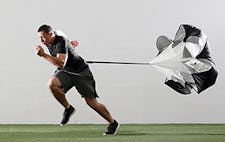
“All the big SAQ facilities were focusing on cone drills, ladder drills, and sprinting with gadgets like parachutes. While those things may look cool to parents, they often don’t improve performance. Most athletes (especially ages 12-17) are slow because of a lack of strength and mobility.”
Cone drills and parachutes are for car commercials. They show you what the car is capable of, but not what it can do in the real world. These implements are helpful for making athletes get efficient with their ability to cut, but they don’t address the root cause of their lack of speed.
DeFranco expands: “Strength is needed to apply adequate force into the ground and propel the body forward. It’s also responsible for maintaining the proper posture while moving at high speeds. Mobility is needed to achieve a full range of motion and increase stride length. If an athlete lacks strength and/or mobility, you can do all the cones drills and parachute sprints in the world and they still won’t get faster.”
While Joe DeFranco’s competitors were focusing on the glitz and glamor, he was focused on getting his athletes to the Show and helping them achieve their ambitions. His athletes were getting brutally strong and more mobile in a facility that would have fit in a corner of his competitors’ places.
“The end result [of my style of training] was that my athletes would routinely break records in the 40-yard dash, 20-yard shuttle, and vertical jump at high school football combines. My track athletes were shaving tenths of seconds off their sprint times and winning state titles.”
DeFranco’s Gym Expands
As DeFranco’s Gym increased in popularity, he did what all smart marketers do to build their business…he turned to the internet. www.DeFrancosTraining.com was created and the first-ever “ASK JOE” was posted. The website received 51 hits that first month and 17 people subscribed to the website’s e-newsletter.
Today, the website averages over 8 million hits per month and has over 40,000 e-newsletter subscribers. There have been 250+ blog posts and close to 1000 “ASK JOE” questions answered since that first blog post.
Shortly after the start of “Ask Joe”, Joe DeFranco released the first-ever VHS tape describing how to “beat” the football combine tests. Mastering the Football Combine Tests shocked the football community and forever changed the way athletes prepare for football combines.
Joe continued to surprise the football community when he revealed the training program that he designed for Brian Cushing – as well as many other successful high school athletes – in an article entitled, Westside for Skinny Bastards: A Modified Lifting Program for Hardgainers. It became one of the most popular training programs ever written.
By Cushing’s senior year, demand for Joe DeFranco was at an all-time high. Cushing became the first DeFranco-trained All-American high school athlete. As a result, high school football players from all over New Jersey started calling DeFranco’s Gym and inquiring about training because they “wanna be like Cush”.
With this demand Joe realized that he needed to grow. In September of 2005, DeFranco’s Gym outgrew the storage closet and moved into its very own location – a 2,000 square foot warehouse in an industrial park in Wyckoff, NJ – just 1 year after he licensed his LLC.
INTERACTIVE TIMELINE
How DeFranco Gets RESULTS
Although Joe initially made a name for himself by focusing on strength and mobility (due to a lack of space in his gym), he’s quick to point out that he doesn’t place a specific label on his training philosophy.
“Too many coaches and trainers feel like they have to choose sides in this industry. They label themselves as a ‘speed guy,’ or a ‘strength guy,’ etc. I’m none of those things. I’m a RESULTS guy! I think part of being a great coach is being well versed on all the different aspects of athletic development and knowing when and how to improve them.”
One guy, typically the Strength & Conditioning Coach, has to address the needs of his athletes. But athletes are much more than just strength and conditioning. That same coach is also responsible for speed, power, mobility, agility, anaerobic capacity, and aerobic capacity. It’s his job to figure out what the athlete needs to focus on in order to achieve their desired result. Unfortunately, most of the time these coaches can’t individualize the programs. DeFranco’s individualistic approach is one of many techniques that makes him stand apart from everyone else.
“For example, if an NFL lineman came to me and was already strong, but he lacked speed and mobility, I would be doing a disservice if I had him spend the majority of his time with me lifting weights. An athlete like this would benefit much more from learning how to foam roll and stretch properly, coupled with a focus on speed training.”
DeFranco’s refusal to specialize in a single area and instead, have a global approach that he can tweak based on an individual’s needs, is a big part of his equation for success with a diverse group of athletes. Some of his most well-known clients may be NFL players, but he’s also helped Olympic Figure Skaters reach their athletic potential.
For some, reaching their athletic potential means breaking records at the Combine. For Brian Cushing, a 261 pound beast, it’s jumping over a 64” hurdle.
To give you some perspective about how high 64” is, here’s a chart of things Brian Cushing can jump over:
Dog (18”) Fire Hydrant (30”) Mailbox (45”) 2016 Ford Focus (57.7”) Michael J. Fox (64”)
Cushing: The Road to Recovery
Brian didn’t get to where he’s at just by crushing running backs, destroying wide receivers, jumping hurdles and lifting weights. There’s a whole side of the workout equation that hasn’t been discussed yet and it’s arguably just as important – if not more so. And that’s recovery.
In order to build muscle, you have to break it down. Once it’s broken down, if the muscle is supplied with proper nutrition the muscle recovers properly, it comes back bigger and stronger than it was before. But the NFL’s grueling schedule (and, of course, age) doesn’t allow Cushing to continue building muscle throughout the season.
Football is a brutal sport. Players that last 10 years (excluding quarterbacks and kickers) are seen as iron men. Each play is a mental and physical battle – 6 seconds of being in 5th gear and pushing your body to the edge of its limits. There’s no easing into it or out of it. You turn it on as quick as you can and do your best to recover before the next play comes.
In 2014, there were 64 plays on offense for each team per game on average. Multiply that by 16 games, and you’ll find out that NFL players (assuming they play every snap) battle it out approximately 1024 times each regular season. It’s a long, physical war and it takes its toll on the bodies of the players.
During the season, Cushing’s focus is not on building muscle. Instead, he’s doing his best just to maintain his muscle mass and is actively recovering.
“It’s a race to feel as good as you can for next Sunday,” Cushing conveyed.
At the age of 22, Brian Cushing was given a salary of $320,000 and a roster bonus of $1.2 million. For many rookies, the draw of an expensive purchase to show off their newfound wealth is too great. Expensive cars, jewelry, spending $10,000 a night in a club… It’s all there for the taking. But Cush’s first major purchase wasn’t any of those things. It was a hyperbaric oxygen chamber.
Cushing decided to invest in himself. In any professional sport, your body is your most important asset. Fail to take care of it and it will fail to take care of you. There’s no shortage of people that want to get paid millions of dollars to do something they love. If you get injured or can’t keep up with the younger players because you didn’t take care of your body well enough, someone will fill in the hole you left. That’s why recovery is vital to every athlete’s success.
After college games, Cush would go home and maybe have a beer or two. But the focus in college was a lot different. Whether it was off-season or the week of a game, he was pushing himself as hard as he could go. The goal was to get as big, strong, and fast as possible. With a younger body, he could recover quicker and didn’t need to worry about things like cold tubs or hyperbaric oxygen chambers.
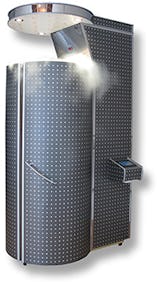 “I don’t know how in college, I felt OK on Monday. I’m a lot more educated now about getting back and trying to benefit myself. I go in my hyperbaric chamber when I have an hour to myself at night and immediately after a game. It helps a lot…between that and the cryo chamber. I use [the cryo chamber] once a week. It’s like a cold tub in 2 minutes. They’re great. You can tell when you walk out of something the way you feel – especially when you go to practice the next day.”
“I don’t know how in college, I felt OK on Monday. I’m a lot more educated now about getting back and trying to benefit myself. I go in my hyperbaric chamber when I have an hour to myself at night and immediately after a game. It helps a lot…between that and the cryo chamber. I use [the cryo chamber] once a week. It’s like a cold tub in 2 minutes. They’re great. You can tell when you walk out of something the way you feel – especially when you go to practice the next day.”
By investing in himself and spending time on his recovery, Cushing was able to get the dividends due to him. In 2009, he was named Defensive Rookie of the Year by a wide margin. Out of 50 votes, Cush received 39. Cushing’s had a few injuries that have kept him off the field, but even in 2015, he’s still one of the most fearsome linebackers in the league thanks in part to his attention to recovery.
For DeFranco’s gym though, there never was a second he could spend recovering. Instead, he was constantly pushing and the gym kept growing.
DeFranco Heads South
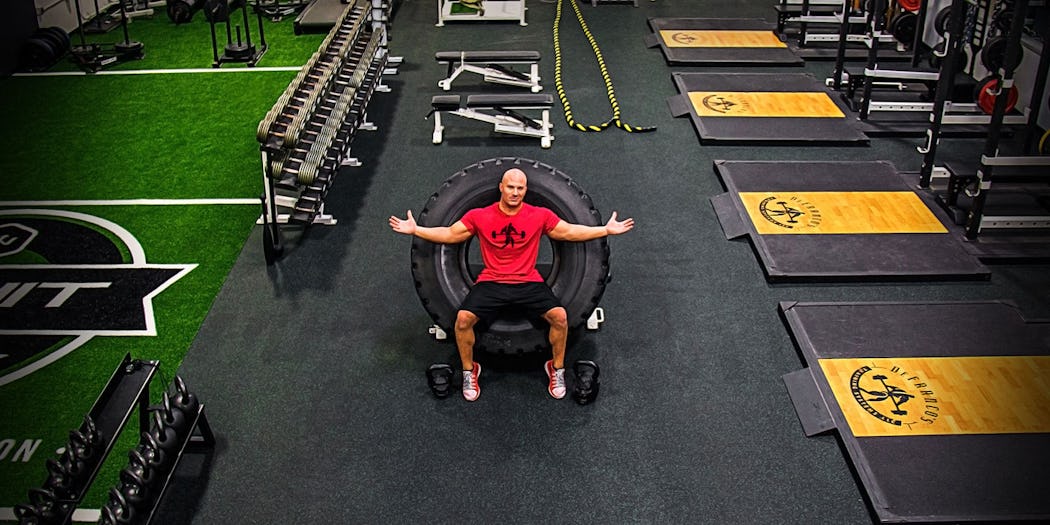
What originally started out as a 500 square foot storage closet eventually turned into a 5,000 square foot facility that had everything DeFranco needed to train his clients – everything except a hill to have them run on. For that, DeFranco takes them to the very same hill his father used to have him run as a child.
DeFranco’s model has now moved to Austin, Texas. Joe partnered with Onnit founder Aubrey Marcus and together they launched DeFranco’s Gym at the Onnit Academy in October 2014. But this is not your typical “satellite” location. Both Aubrey and Joe agreed that this facility needed to be THE facility. If it were just known as DeFranco’s “other” gym, it wouldn’t work. DeFranco’s Gym at the Onnit Academy needed to be the REAL DEAL.
After spending two days in Austin at Onnit’s headquarters, Joe was so impressed that he agreed to move his actual gym to Texas. Every single piece of equipment from DeFranco’s New Jersey-based gym was thrown in an 18-wheeler and shipped to Austin, Texas – blood, sweat, and chalk included… Joe and Aubrey felt this was the only way to ensure that the true energy and mystique of DeFranco’s Gym would carry over to their Texas facility.
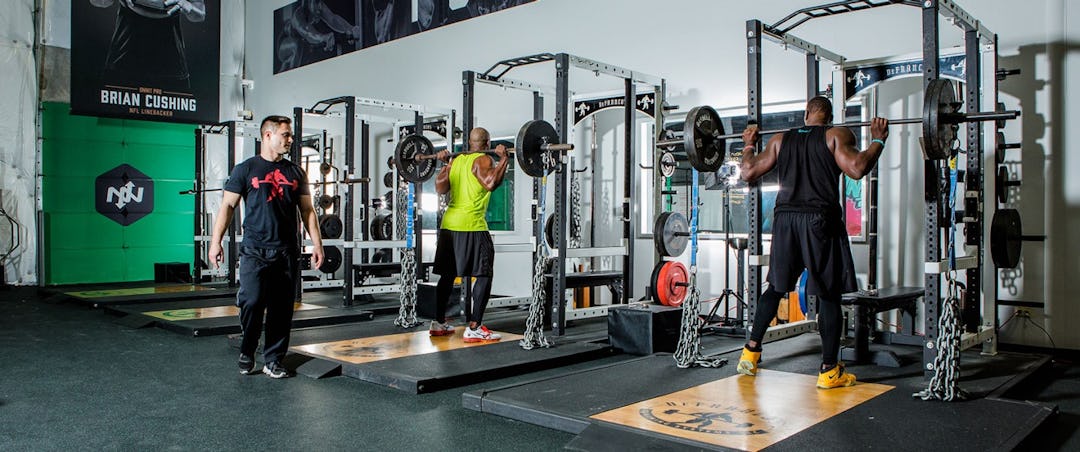
Combining DeFranco’s training methods with Onnit’s approach to Total Human Optimization seemed to be a match made in heaven. According to DeFranco, “DeFranco’s Gym at the Onnit Academy is about to change the fitness industry forever.” Something tells me you’d be crazy not to believe him.
Onnit Academy Extra

As mentioned earlier, the goal during the season is entirely different than the off-season. The off-season is a time for growth. It’s the time to get bigger, faster, stronger, and make tweaks to your diet. Cushing’s off-season workout is designed to build muscle and make him more explosive. Just try and keep up.
“Every morning I take 2-3 Alpha BRAIN® pills. This product keeps me mentally sharp throughout the day. It has helped me tremendously in my day to day routine and anytime I have a game or hard workout I take Shroom TECH Sport. It has been the most effective product I have taken for long cardiovascular workouts.”
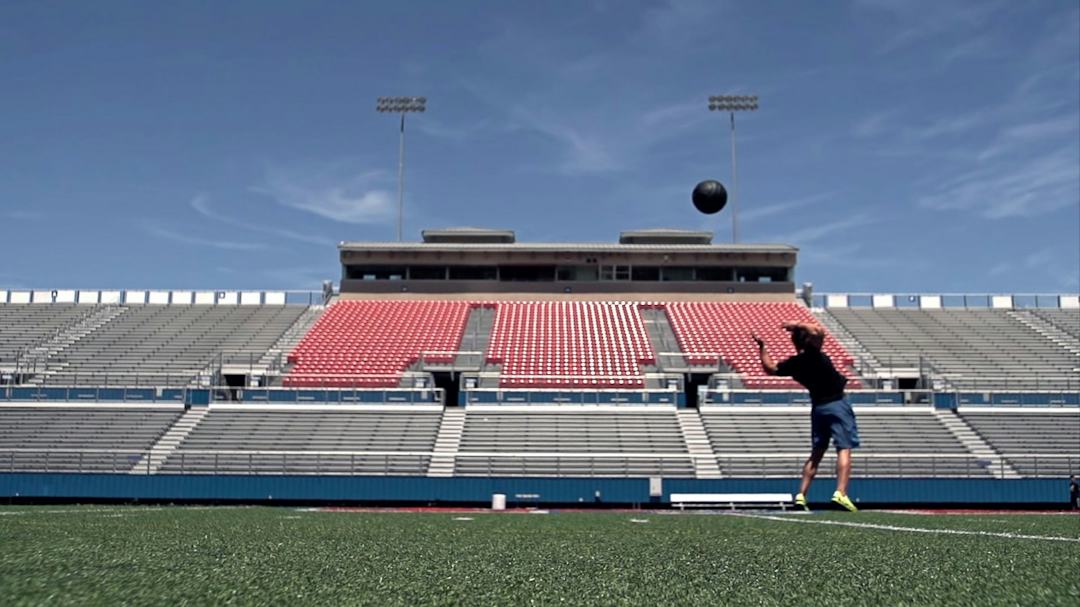
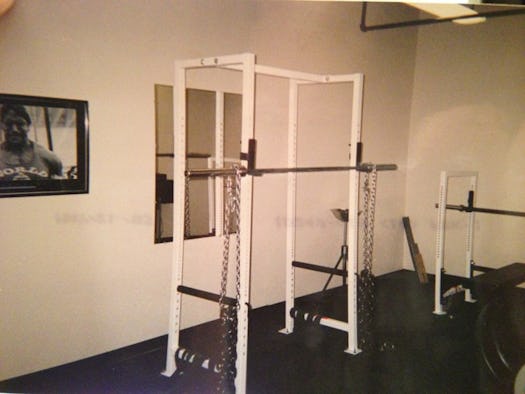
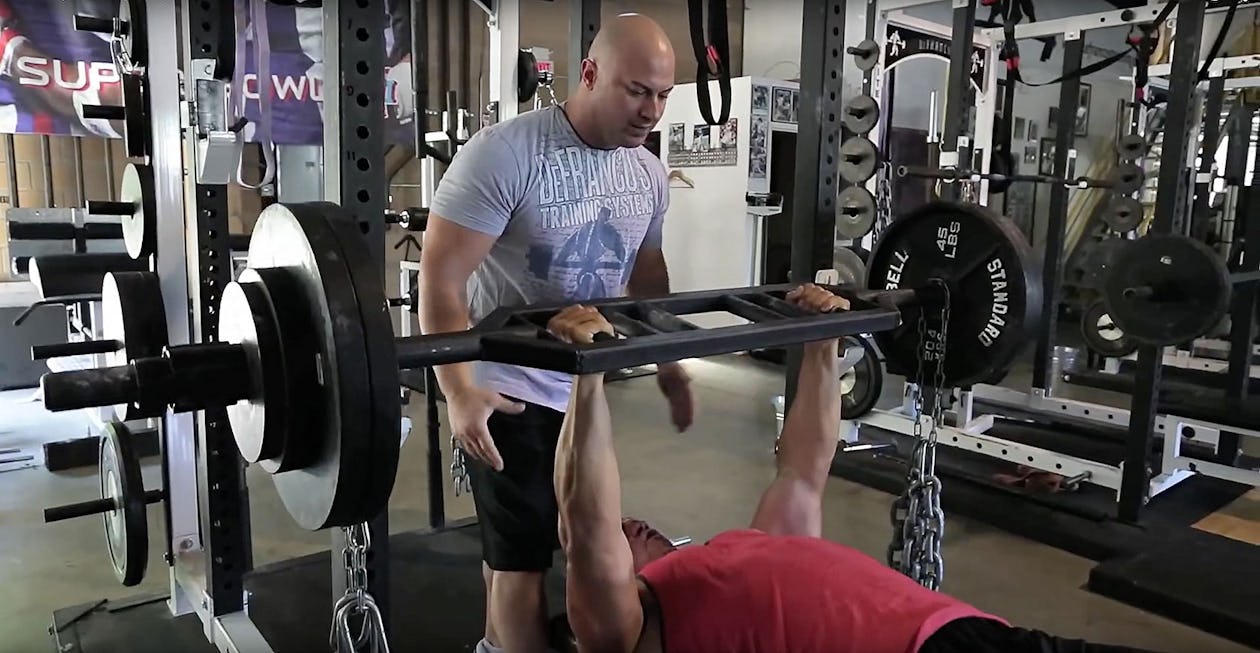
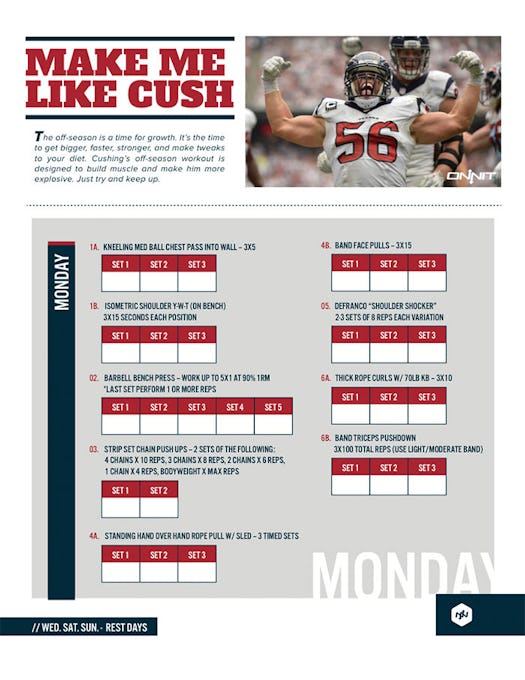
)
